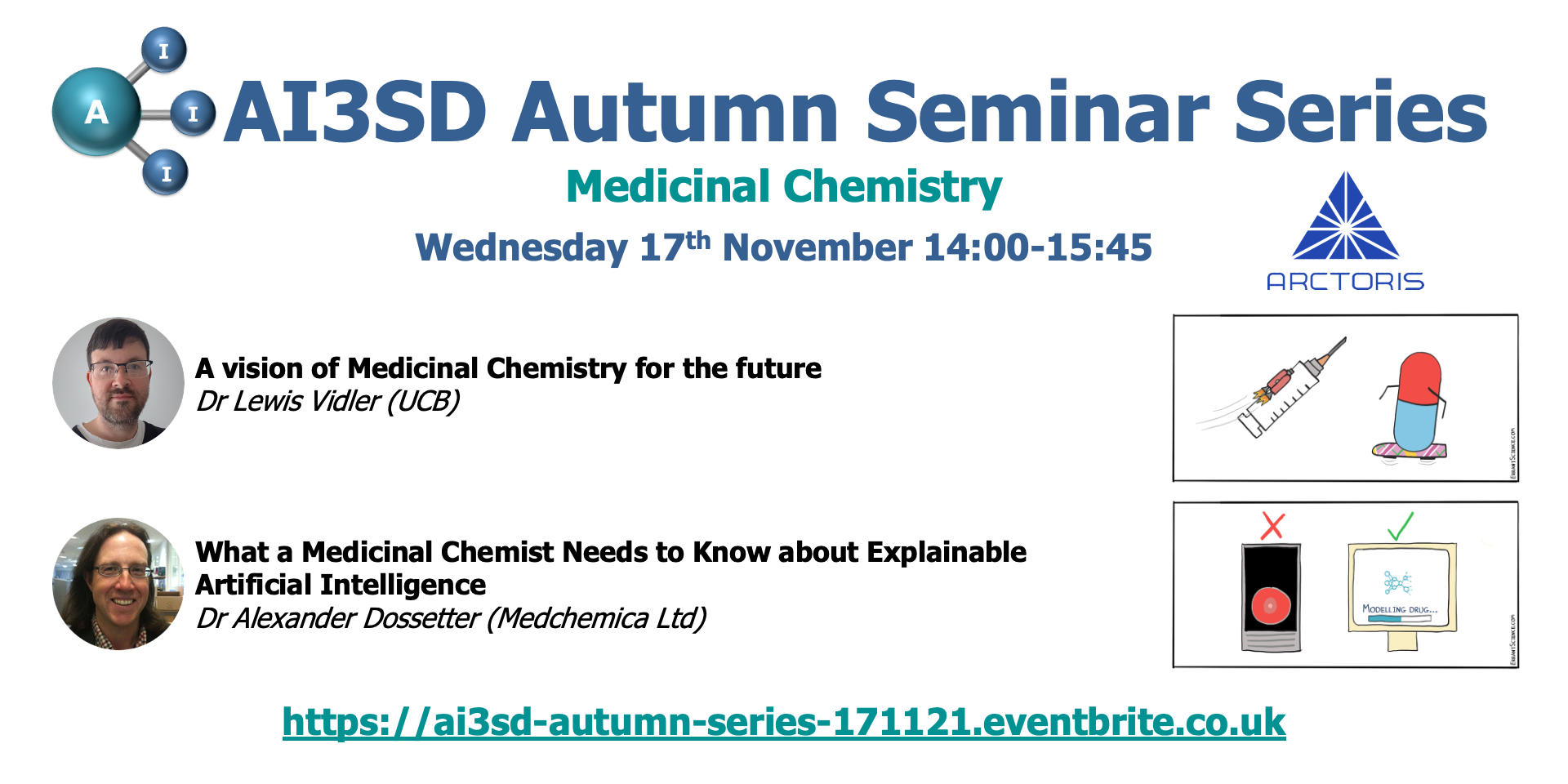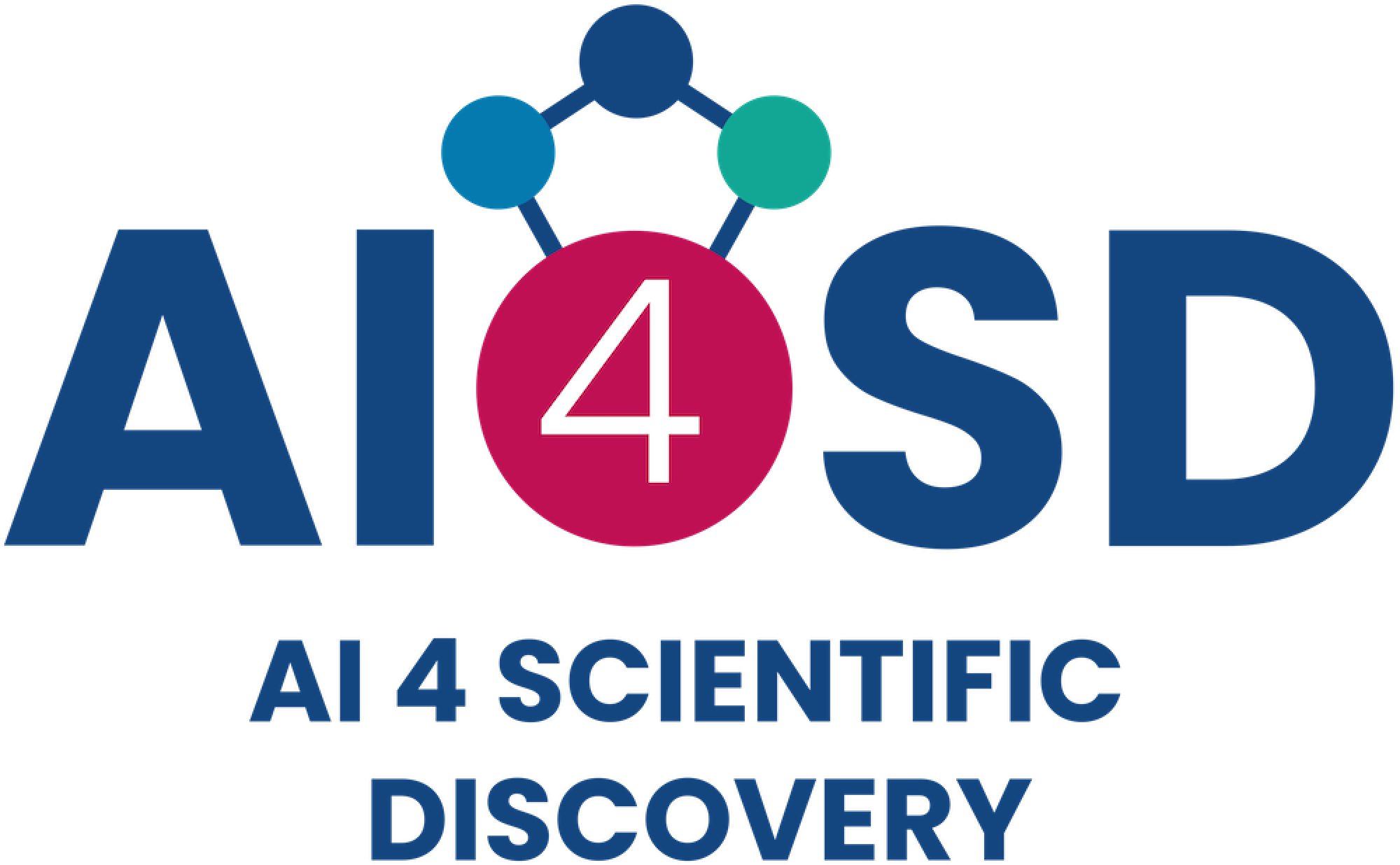
- This event has passed.
17/11/2021 – AI3SD Autumn Seminar VI – Medicinal Chemistry
17th November 2021 @ 2:00 pm - 3:45 pm
Free
Eventbrite Link: https://ai3sd-autumn-series-171121.eventbrite.co.uk
Description:
This seminar forms part of the AI3SD Online Seminar Series that will run across the autumn (from October 2021 to December 2021). This seminar will be run via zoom, when you register on Eventbrite you will receive a zoom registration email alongside your standard Eventbrite registration email. Where speakers have given permission to be recorded, their talks will be made available on our AI3SD YouTube Channel. The theme for this seminar is Medicinal Chemistry.
Agenda
- 14:00-14:45: A vision of Medicinal Chemistry for the future – Dr Lewis Vidler (UCB)
- 14:45-15:00: Coffee Break
- 15:00-15:45: What a Medicinal Chemist Needs to Know about Explainable Artificial Intelligence – Dr Alexander (Al) G. Dossetter (Medchemica Ltd)
Abstracts & Speaker Bios
- A vision of Medicinal Chemistry for the future – Dr Lewis Vidler: Historically, medicinal chemistry and computational chemistry have been separate roles within a drug discovery organization requiring differing backgrounds and expertise. Increasingly in the modern world and going forwards these skillsets are coming closer and closer together, empowered by automation and increasingly advanced computational methods. Over time, there has been an increase in the amount of time a medicinal chemist spends at a computer compared with time in the lab which is expected to continue. For computational chemists, historically, the core skills were of computer science, not of chemistry due to the lack of well developed tools and computing power. As time goes on, with increases in the user friendliness of available tools and increases in automation, these roles are likely to move closer together, with others joining the field with more mixed skillsets too. The role of automation will likely increase allowing for easier synthetic tasks to be carried out by robots, and the more trivial thinking tasks to be carried out by a computer, leaving human scientists to perform more challenging laboratory work, and think about the most important problems. This presentation will discuss the likely necessary skills of the future, compared to those of today, and the role automation has to play in this transition.
Bio: Lewis Vidler is a principal research scientist in computational medicinal chemistry at UCB, based in the UK. He completed an MChem Chemistry degree at the University of Oxford specializing in synthetic organic chemistry, followed by a PhD at the Institute of Cancer Research (ICR) in applied computational chemistry. After he finished his PhD he joined Eli Lilly and Company initially as a contractor before progressing to Senior Research Scientist and has primarily worked on active drug discovery projects in that time. For the past 17 months he has been working at UCB continuing to apply computational methods to drive drug discovery projects forward. Outside of direct project support he has significant interest in automating aspects of drug discovery and empowering others with data analytics tools. - What a Medicinal Chemist Needs to Know about Explainable Artificial Intelligence – Dr Alexander (Al) G. Dossetter: The latest developments in artificial intelligence (AI) have arrived into an existing state of creative tension between computational and medicinal chemists. At their most productive, medicinal and computational chemists have made significant progress in delivering new therapeutic agents into the clinic. However, the relationship between these communities has the prospect of being weakened by application of over-simplistic AI methods which, if they fail to deliver, will reinforce unproductive prejudices. AI systems are action orientated; they suggest, and even automate, possible steps to take next in drug hunting projects. They do this by generating options, preforming predictions, then ranking the options. A key piece of critical learning is that any AI system for chemists should be open and ‘explainable’. The requirement for the chemist to understand how models have been built and ‘drill back’ to original data is key to explain how the computer has arrived at the prediction. For example, an AI system that aids the medicinal chemist in evaluating and designing new biologically active compounds should focus on communicating, in the preferred mode of the medicinal chemist, via critical substructures, and map to the original compounds and test data on which the model was built. Without this, any model becomes labelled as ‘black-box’ and confidence is reduced in the suggestions made. Therefore, to develop them further and to understand the quality of any prediction, transparency and auditability should be designed into a system from inception (see example below where the predictions are made for a compound and the contributions from the model highlighted). The talk will show practical examples from drug discovery projects and recent compounds from the global Covid Moonshot drug discovery program.
Reference:
Griffen, E. J.; Dossetter, A.G.; Leach, A.G.; Chemists: AI Is Here; Unite To Get the Benefits J. Med. Chem. 2020, 63, 16, 8695–8704 https://doi.org/10.1021/acs.jmedchem.0c00163
Bio: In 2012 Dr Al Dossetter co-founded MedChemica Limited centred around the technology of Matched Molecular Pair Analysis (MMPA) as a method of accelerating medicinal chemistry. MedChemica now licenses a suite of Artificial Intelligence databases, and tools on-line, for organisations to extract and share knowledge from their own data. The software and methodologies have been used by chemists in many pharmaceutical companies, universities and bio-techs to accelerate drug discovery programmes. Extending the methodology enabled MedChemica Limited to share medicinal chemistry knowledge between the research branches of AstraZeneca, Hoffman La Roche and Genentech. In addition MedChemica offers consultancy services on drug discovery project and Al has helped multiple project achieve their goals. Previous to MedChemica Al gained his PhD from Nottingham University and after post-doctoral research at Harvard University joined AstraZeneca (AZ). He spent 13 years in medicinal chemistry spread across oncology (hormonal and kinase inhibitors), inflammation (OA and RA, enzyme inhibitors and GPCR targets) and diabetes (obesity, GPCR and enzyme inhibitors), delivering multiple projects and candidate drugs.
